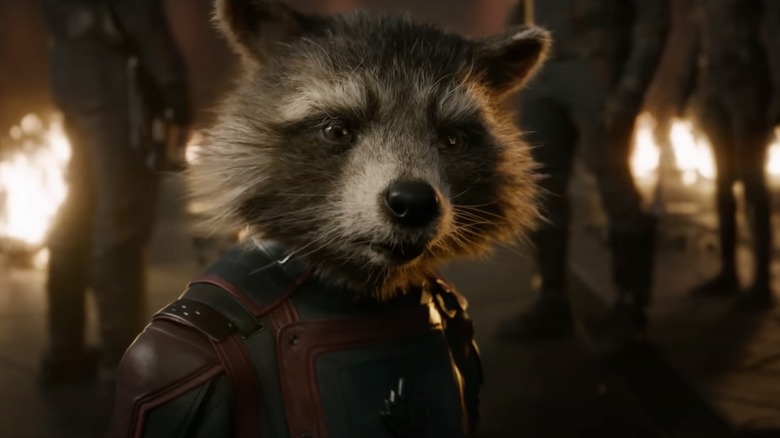James Gunn Had One Strict Rule For All Of Rocket Raccoon's MCU Appearances
This post contains spoilers for "Guardians of the Galaxy Vol. 3."
When moviegoers first met the Guardians of the Galaxy in 2014, the team was standing in the cosmic Marvel Cinematic Universe version of a police lineup. Though short of stature, Rocket Raccoon, voiced by Bradley Cooper, showed plenty of feral attitude, spitting and snarling as John C. Reilly's Nova Corps member, Rhomann Dey, briefly ran down his back story as "the result of illegal genetic and cybernetic experiments on a lower life form."
Fast forward to 2023, and now Rocket and his back story are at the center of "Guardians of the Galaxy Vol. 3," where we hear the High Evolutionary (Chukwudi Iwuji) dehumanize him — or de-racoon-ize him, as the case may be — using the same designation, "Subject: 89P13," in place of his name. Unlike Nebula, who has evolved, some say, to become the best MCU character, Rocket has been slower to achieve growth despite appearing across multiple films. Even in crossover films like "Avengers: Infinity War," "Avengers: Endgame," and "Thor: Love and Thunder," none of which he helmed, "Guardians" trilogy writer-director James Gunn had a strict rule that he followed for Rocket. As Gunn explained to The New York Times this month, that meant keeping Rocket self-interested and unheroic:
"I was very, very careful through all the movies, including the 'Avengers' movies and 'Thor' and everything, that Rocket never does one single action that is for anyone other than himself or his friends. He's not a hero like the rest of them. Morally, he's much more stunted than Nebula is by the end of the 'Avengers' series. He has just cut himself off completely from feeling for people."
A hero raccoon shall rise
In "Guardians of the Galaxy Vol. 3," Rocket is still slow to accept that he's even a raccoon, though we see in flashbacks how the High Evolutionary genetically modified him and other animals so they could talk in the anthropomorphic Disney tradition. This allows for moments of sheer ridiculousness, as in the scene above, when Rocket's walrus friend says, "I think my name shall be Teefs," or his rabbit friend says, "Me be called Floor, because me is lying on floor."
According to The Escapist, this also plays into the "tug of war over the question of what Rocket is supposed to be: a product or a person," as "Vol. 3" works through its subtext about James Gunn's struggle as an artist wedded to the corporate-minded Disney (the parent company of Marvel Studios). In his New York Times comments, Gunn himself cited the ending scene where Rocket frees other raccoons as the turning point for his character:
"At the end of 'Vol. 3,' in that moment where he accepts himself by taking those raccoons and then starts looking around the cages, that's the moment to me where he sees, 'Oh my God, everything is me. We're all a part of this universe, and every life has purpose, meaning, and is worthy of respect.' That's who he is now: He's not a bad guy, he's strictly a good guy."
By the end of "Guardians of the Galaxy Vol. 3," Rocket finally embraces his true nature as a raccoon, hero, and person of sorts, not just a piece of intellectual property. It's a kinder, gentler Rocket Raccoon who is willing to spare the High Evolutionary's life, in keeping with the movie's theme of accepting oneself and others.
"Guardians of the Galaxy Vol. 3" is in theaters now.
